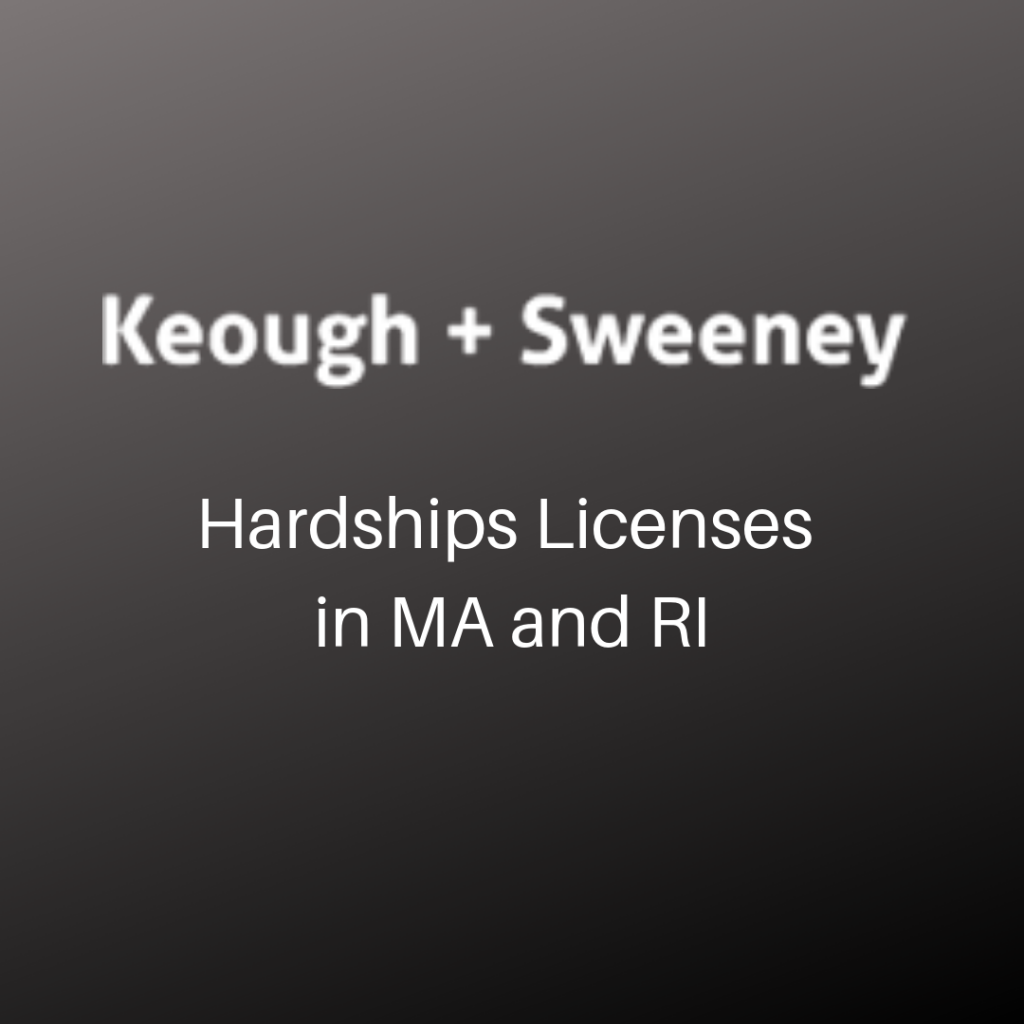Hardship Licenses in MA and RI

Hardship licenses may be issued if your normal driver’s license has been revoked or suspended. A hardship license will allow you to drive under certain circumstances and for approved reasons. Rhode Island and Massachusetts are both states that offer a hardship license.
In Rhode Island, a DUI used to mean you lost your right to drive without any ability to seek a hardship license, though this is no longer true. The State of Rhode Island now allows certain individuals convicted of Driving Under the Influence/drunk driving or Refusal to Submit to a Chemical Test the ability to seek a hardship license. This requires a hearing where a judge may allow you to drive for a twelve (12) hour period for work or other purposes provided by law. The hardship license also requires the installation of and ignition interlock device.
A conditional hardship license may be granted to individuals who plead guilty to, or are convicted of, their first or second DUI or first Refusal to Submit to a Chemical Test. Before being granted, typically, you will be required to inform the court of your employment status, hours of employment, and hardship that will be suffered without a conditional license. If granted, the hardship license allows the individual to drive for a twelve (12) hour period each day to meet one of the following needs:
- Work
- Medical appointments
- Therapy appointments
- Job training
- School
- Another reason the Judge deems valid
After the Judge grants your request for a conditional hardship license, you must bring the following to the Rhode Island Department of Motor Vehicles: (1) the court order granting the conditional hardship license, (2) proof of an SR-22 insurance policy (an insurance bond separate from your liability insurance); and, (3) proof of ignition interlock device installation. At that point, the DMV will issue you a new license with an endorsement allowing you to drive to and from work or for any other reason allowed by the Court.
In Massachusetts, hardship licenses are granted at the discretion of the Registry of Motor Vehicles requiring a hearing at one of the Registry’s Service Centers located in Boston, Brockton, Fall River, Lawrence, Pittsfield, South Yarmouth, Springfield, Wilmington, or Worcester. In Massachusetts, however, you are not eligible for a hardship license if you rejected the offer by the officer to take a breathalyzer or blood test.
A RMV hearing officer may grant a Hardship License to individuals who plead guilty to, are convicted of an OUI offense, or whose case has been disposed of via plea of Continued Without a Finding. A hearing will be held to prove eligibility, and if the hardship license is granted the individual can drive for a twelve hour period each day to meet one of the following needs:
- Work
- Medical appointments
- School
- Another reason the RMV hearing officer deems valid
Massachusetts eligibility requirements for a hardship license depend on the facts and circumstances of your case.
Applicants who qualify as a first time OUI offender can apply for a hardship license as soon as three days after entry of conviction or plea. Applicants who have multiple OUI convictions are required to serve a portion of the license suspension before applying. For multiple or serious offenders, the hardship license may also require the installation of an ignition interlock device.
The RMV will not issue a hardship license without documented proof that the applicant has a need for such license. Need can be established with a letter from the applicant’s employer indicating that applicant is an employee, that the applicant will need a license to get to work and/or perform job responsibilities, and that there is no adequate public transportation available.
A self-employed applicant must present proof of self-employment. Acceptable forms of proof consist of a business certificate, tax forms indicating self-employment, and/or a current professional license. The applicant must also present a letter on his/her own behalf explaining his/her need for a hardship license and the hours requested.
Applicants applying for other purpose (i.e. education, medical treatments), require third party documentation of the hardship. The applicant is responsible for providing proof regarding the availability of public transportation. This proof may be included within the employer’s letter. The applicant may also provide local bus/transit routes, MapQuest etc.
This is only a small amount of information on hardship licenses in Massachusetts and Rhode Island. If you have further questions, Keough + Sweeney is here to help with these questions or with cases concerning OUI or DUI. Visit one of our offices located in Raynham or Boston, MA or our Rhode Island office located in Pawtucket.


